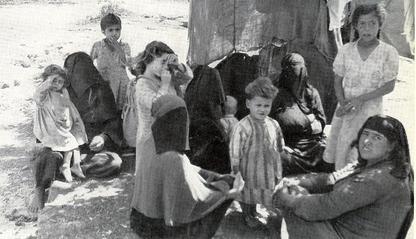The sacking of Arab Lydda to make Jewish Lod
 Monday, November 4, 2013 at 11:39PM
Monday, November 4, 2013 at 11:39PM 
Refugees from Lydda, 1948
The Nakba in teh New Yorker
http://muzzlewatch.com/2013/10/17/the-nakba-in-the-new-yorker/
by Marilyn Kleinberg Neimark

Buildings in Lydda smashed by Israeli aerial bombardment, 1948. The houses left standing were quickly moved into by Israeli Jews to prevent the Palestinians who had been driven out returning to claim them. Almost overnight, the Palestinian city of Lydda became the Israeli Jewish town of Lod.
For decades, the subject was declared off-limits, even for a former Israeli prime minister who wanted to talk about brutalities he’d witnessed himself. As David Shipler reported in the New York Times in 1979, in “Israel Bars Rabin From Relating ’48 Eviction of Arabs,” a “censorship board composed of five Cabinet members prohibited former Prime Minister Rabin from including in his memoirs a first-person account of the expulsion of 50,000 Palestinian civilians from their homes” in Ramle and Lydda (Lod) during the 1948 Arab-Israeli war. (Rabin attributed the expulsion orders to David Ben Gurion.)
But thanks to the research in the late 1980s of the New Historians ( Benny Morris’sThe Birth of the Palestinian Refugee Problem, 1947-1949; Simha Flapan’s The Birth of Israel; Ilan Pappé’s The Ethnic Cleansing of Palestine, among others) and, more recently, the work of Zochrot, the events of 1947-1949 have been discussed and angrily disputed within Israel, despite the efforts of a variety of right-wing organizations to prevent such discourse and of Israeli legislationto penalize commemoration of the Nakba (American Jews on the other hand have been more successful in stifling discussion, at least until now.)
In vivid, excruciating, undeniable, documented detail, Shavit’s New Yorker article describesboth the massacre of hundreds and the expulsion of 35,000 residents of Lydda. And with astonishing bluntness, Shavit states:
- See more at: http://muzzlewatch.com/2013/10/17/the-nakba-in-the-new-yorker/#sthash.81tJfw1B.dpuf
“Lydda is the black box of Zionism. The truth is that Zionism could not bear the Arab city of Lydda. From the very beginning, there was a substantial contradiction between Zionism and Lydda. If Zionism was to exist, Lydda could not exist. If Lydda was to exist, Zionism could not exist. In retrospect it’s all too clear.”
“Do I wash my hands of Zionism? Do I turn my back on the Jewish national movement that carried out the destruction of Lydda? No. Like the brigade commander, I am faced with something too immense to deal with. Like the military governor, I see a reality I cannot contain. When one opens the black box, one understands that, whereas the massacre at the mosque could have been triggered by a misunderstanding brought about by a tragic chain of accidental events, the conquest of Lydda and the expulsion of Lydda’s population were no accident. Those events were a crucial phase of the Zionist revolution, and they laid the foundation for the Jewish state. Lydda is an integral and essential part of the story. And, when I try to be honest about it, I see that the choice is stark: either reject Zionism because of Lydda or accept Zionsim along with Lydda.
Put that way, it’s no wonder Shavit concludes despairing of the future:
“But, looking straight ahead at Lydda, I wonder if peace is possible. Our side is clear: we had to come into the Lydda Valley and we had to take the Lydda Valley. There is no other home for us, and there was no other way. But the Arab’s side, the Palestinian side, is equally clear; they cannot forget Lydda and they cannot forgive us for Lydda. You can argue that it is not the occupation of 1967 that is at the core of the Israeli-Palestinian conflict but the tragedy of 1948, It’s not only the settlements that are an obstacle to peace but the Palestinians’ yearning to return, one way or another, to Lydda and to dozens of other towns and villages that vanished during one cataclysmic year. But the Jewish State cannot let them return. Israel has a right to live, and if Israel is to live it cannot resolve the Lydda issue. What is needed to make peace now between the two peoples of this land may prove more than humans can summon.”
It’s a startling admission that strangely points to where hope, if there is to be any, will be found: in Israeli recognition of the Nakba and the demand that Israelis either embrace a history as ethnic cleansers or work toward a future in which Israel becomes a democracy of all its people. There is a choice there. - See more at: http://muzzlewatch.com/2013/10/17/the-nakba-in-the-new-yorker/#sthash.81tJfw1B.dpuf